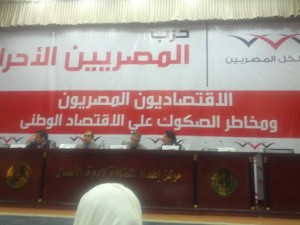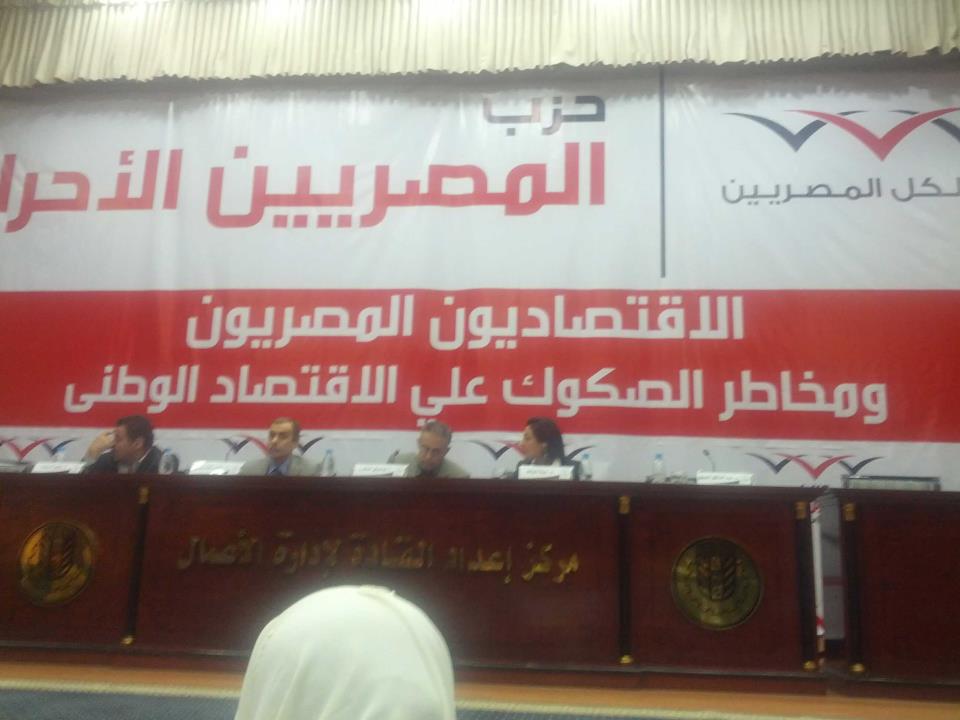
(Photo courtesy of Free Egyptians Party Facebook Page )
By: Lamia Nabil
The Free Egyptians Party launched a campaign to reject the new sukuk law during a press conference on Sunday. They aim to collect signatures from both within and outside the party.
The party is also hoping to gain the signatures of economic experts.
However they are yet to decide on the procedures for submitting the signatures to the presidency or the courts, according to the head of the party’s Economic Committee, Dina El-Khayat.
A statement issued after the conference said that the sukuk law ratified by the Shura Council “contains a number of loopholes” in its current form.
Furthermore, says the release, the law suffers from a lack of clarity regarding issuing sukuk for sovereign assets of the state, such as the Suez Canal “or historic sites such as the pyramids”. Article No.3 of the law prevents the use of sukuk for “government-owned assets used for public benefit”.
The party said that the law allows for the use sukuk to own government assets through funding related projects on these assets, which they said will allow for ownership of the original asset via the “back door”.
“The law allows sukuk to be issued to fund, say, the Suez Canal expansion project, but this will allow for ownership of the original asset, the Suez Canal itself” and in this way Article No.3 can be bypassed, said Head of the Free Egyptian Party Ahmed Saeed during his keynote speech at the conference.
“Egyptians will not abandon their sovereign assets, as they will not allow any group or government to possess the Suez Canal or any other sovereign asset,” continued Saeed.
He added that the Egyptian economy does not suffer from funding problems, but suffers instead from a “lack of national conscience or wisdom” on behalf of its leaders. “The real crisis,” he said, “lies with the current ruling government which is “ready to sell anything in order to stay in power at any cost, even if it will be at the expense of people’s property and the future of the coming generations.”
The statement also said that despite sukuk representing common shares in asset ownership, the issued law does not specify how to handle late payments on sukuk.
The statement said the new law also allows waqf, or religious endowment, institutions the right to issue sukuk, something which will allow for the provision of financing for religious movements and their social and charitable activities “under a legal cover”. The law also allows “issuing waqf sukuk for an indefinite period” which according to the statement will allow for “practically unlimited ownership on behalf of waqf insititutions”.
Furthermore the law does not require those chosen for membership of the Central Council for Sukuk to be Egyptian, opening the door for foreign interference into Egyptian affairs
The new law allows only the prime minister and the minister of finance to identify the assets for which sukuk must be issued for, something the party objects to.
Saeed also added that the party “will not stand [passive] with folded arms while passing this law” and that “the party will pursue this corrupted law by all legal, constitutional or popular means, in order to resist any attempt by the government to put up for sale sovereign assets of the Egyptian state”.
El-Khayat said that other countries constantly used as examples by the government in order to legitimise sukuk, mainly rely on “revenue bonds” which deal only with the revenue of assets, leaving ownership of the assets themselves in the hands of the government.
She also added that te Egyptian saving rates are between 13% to 14%, which renders it impossible to achieve the proposed EGP 200bn through sukuk revenues promised by the government, “unless they are intended for specific foreign countries or specific assets”.



